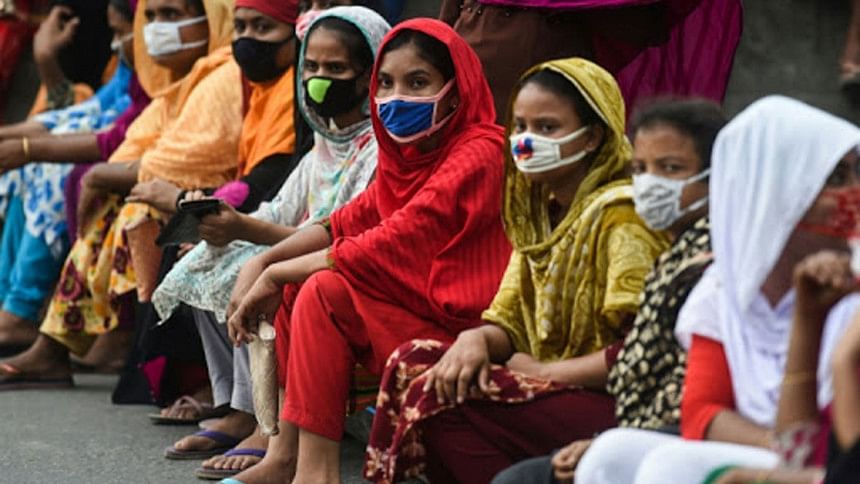Fast fashion’s thorny question

One thing there has yet to be much discussion about since the onset of the Covid-19 pandemic is the issue of waste. We know that hundreds of millions of dollars' worth of garment and textile orders have been cancelled or postponed. We also know that this is a global issue—affecting Bangladesh, Pakistan, India, Cambodia and all other garment production hubs.
As I write this, mountains of clothing which may never be sold is piled up at ports, in warehouses, and on factory floors. What on earth will happen to it all? It is impossible to tell but there are several possible options for such clothing. It might still be sold to buyers. In fact, many brands have agreed to take their orders, but they want a large discount.
What happens to clothing that brands will not take? In some cases, brands have been offering to pay towards the cost of orders, but they do not wish to take the order. They have told the factory supplier they can do with the clothing what they wish, provided that they remove all the brand's labelling and all other traces. Will factories be able to re-sell this clothing? In some cases they may do, but in a great many it is doubtful. For instance, George, the clothing arm of UK retailer Asda, has cancelled a lot of school uniforms. It is difficult to see how such clothing will find a new market anywhere.
It also needs to be factored in that all clothing is seasonal—nobody wants to buy coats in the summer any more than they will buy shorts in the winter.
There are other possible destinations for this excess clothing. It could find its way into the second-hand markets. This would be an excellent option from a sustainability perspective—re-use is high up on the "hierarchy of waste" in sustainability discussions.
What about the rest? Here we come to a rather unpalatable truth. The stark reality is that in many garment production hubs, the options for upcycling, recycling or downcycling clothing are somewhat limited. These are new and emerging markets in many cases. Nobody knows what will happen to the—literally—billions of garment items that will no longer be required because of Covid-19. But I fear that a sizeable amount of these items will be either incinerated or landfilled.
Just consider the irony of that! We have spent years talking about sustainability and the need to make better use of the world's precious resources. We have heard talk of failing cotton crops because of global warming. And yet here we are in a situation where clothing may end up being destroyed because the industry has produced too much. How did we ever get in this mess?
These are exceptional times, we all know that, and nobody could have predicted how this pandemic would pan out and the impact it would have. We have all been blindsided.
But there is something else worth considering here. Since this pandemic began, millions of clothing sales which would otherwise be made have been postponed and may never happen at all. Millions of trips to purchase clothing have not happened. As individuals, we have all purchased far less clothing in the past 1-2 months than at any time previously. In fact, by the end of this year, the overall reduction in the amount of clothing purchased will likely be down by at least 10 percent—probably much more.
And yet, is anybody going cold because they don't have clothing? Are people complaining because they do not have the right shirt or T-shirt or the correct suit? Are people falling ill because they cannot purchase clothing? Obviously not.
What this tells me is what many have been saying for years—we purchase a huge amount of clothing we do not really need. It's frivolous and unnecessary.
Here's another thing: Bangladesh as a garment hub depends on people purchasing things they often do not need. We may not have worried about this in the past, but this is an issue our leaders surely ought to consider moving forwards.
Fast fashion—and this is what we are talking about here—is a brilliant job creator. You only need to look at what happens when you temporarily take fast fashion away from Bangladesh to see this is the case. Our RMG industry is being decimated by the slowing down of fast fashion and millions of jobs are at risk.
But what if after all this is said and done, people globally begin to realise that—actually—they coped quite well not going out and purchasing clothing every weekend? What if new buying habits emerge in the wake of Covid-19 as people start focusing on what they need rather than what they desire?
These are awkward questions, and I do not have any real solutions. What I do know, however, is that fast fashion is criticised day in, day out, in the international media. I have no doubts that the world cannot go on indefinitely creating an excess of "disposable" clothing but I also recognise that, when the world begins to wake up to this fact, countries like Bangladesh will face a real economic problem.
Perhaps now is the time for Bangladesh to start thinking long and hard about its own future in the apparel space. I firmly believe the fashion industry's leaders will be under huge pressure to place more emphasis on value and longevity in clothing production in the coming years. Will our factories be ready to respond?
Mostafiz Uddin is the Managing Director of Denim Expert Limited. He is also the Founder and CEO of Bangladesh Denim Expo and Bangladesh Apparel Exchange (BAE).
Email: [email protected]

 For all latest news, follow The Daily Star's Google News channel.
For all latest news, follow The Daily Star's Google News channel. 



Comments